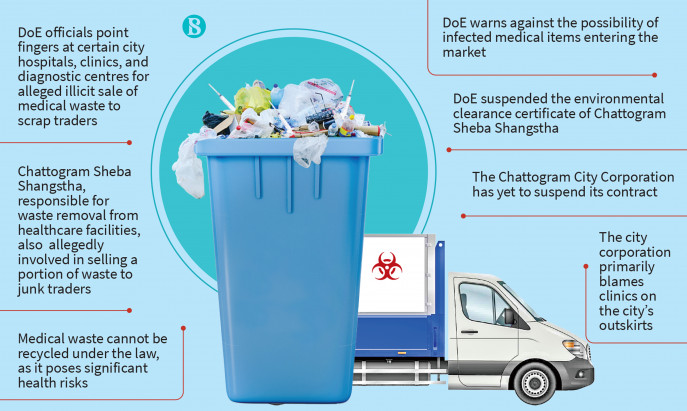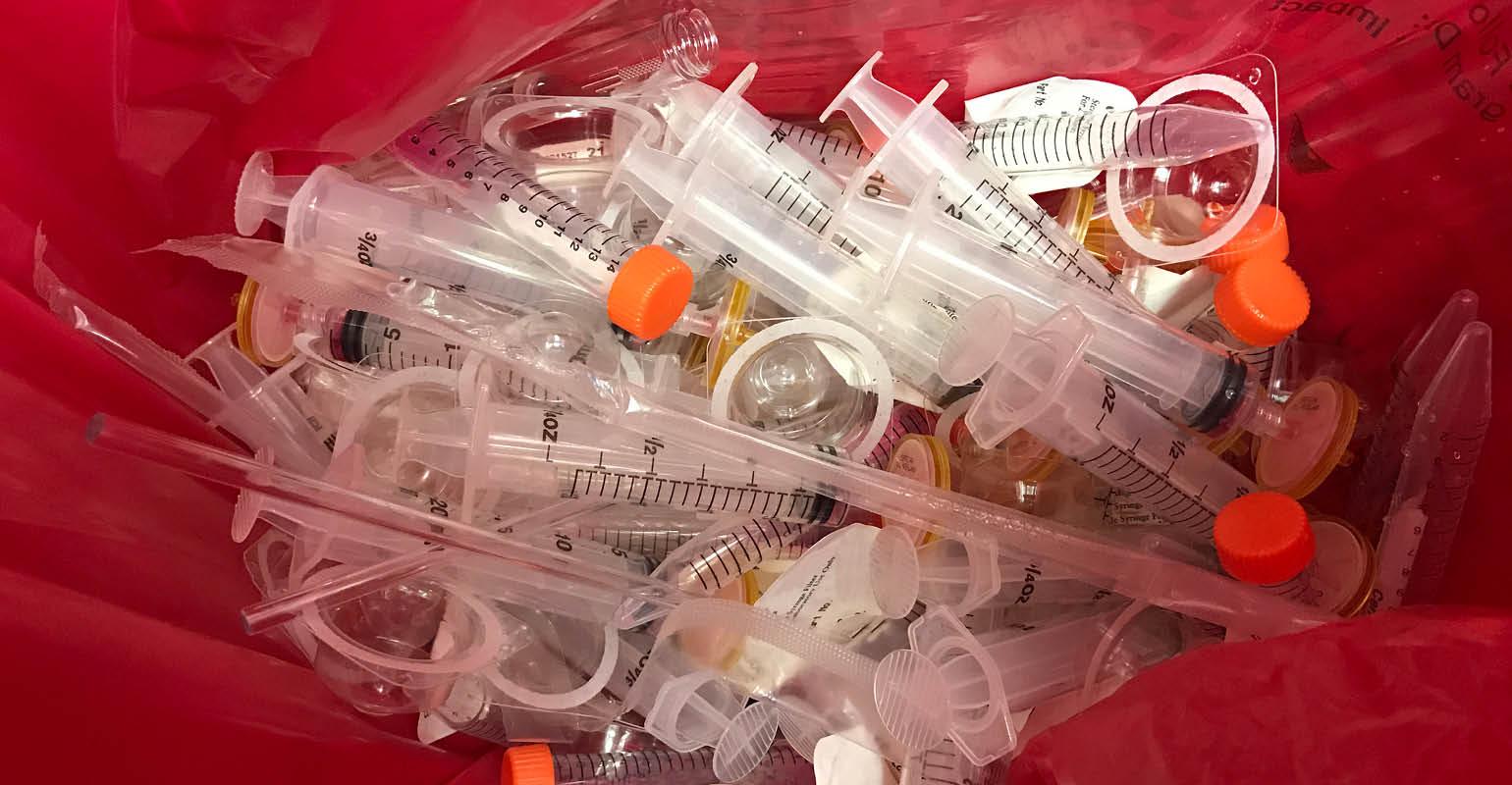Community Treatment: Smooth and Reliable Medical Waste Removal Near Me
Community Treatment: Smooth and Reliable Medical Waste Removal Near Me
Blog Article
Stay Ahead of Laws: Specialist Guidance on Medical Waste Disposal
In a globe where the medical care market is regularly advancing, it is critical for medical centers to remain in advance of laws when it comes to the appropriate disposal of clinical waste. From understanding the various classifications of clinical waste to executing the best collection and segregation approaches, this discussion will give valuable insights and workable tips to aid centers stay in advance of regulations in the ever-changing landscape of medical waste disposal.
Understanding Clinical Waste Categories
Recognizing medical waste groups is crucial for correct disposal and monitoring in medical care facilities. Medical waste describes any kind of waste created by healthcare activities that may present a risk to public wellness or the environment. It is crucial to categorize clinical waste accurately to guarantee its secure handling, transportation, disposal, and treatment.
There are several classifications of medical waste that health care centers need to be knowledgeable about. The most usual groups consist of contagious waste, pathological waste, sharps waste, pharmaceutical waste, and chemical waste. Each classification has certain standards and regulations for its correct monitoring and disposal.
Pathological waste refers to human cells, organs, or body components that require unique handling and disposal. Pharmaceutical waste comprises expired, extra, or polluted drugs that require careful handling and disposal.
Staying Up-To-Date With Regulatory Changes
Remaining present with regulatory modifications is vital for health care centers to make sure conformity and correct administration of medical garbage disposal. medical waste removal. With regulations frequently advancing, it is crucial for health care facilities to remain updated to prevent penalties, fines, and possible injury to the setting and public health
To stay in advance of regulatory changes, health care facilities ought to establish a system for monitoring and monitoring updates. This can be done by signing up for regulative newsletters, going to conferences and workshops, and actively joining industry organizations. Furthermore, facilities ought to mark a personnel or team in charge of remaining educated and distributing info to appropriate stakeholders.
Regular interaction with regulative firms is likewise vital. Healthcare facilities ought to establish connections with local, state, and federal companies to ensure they understand any kind of adjustments in guidelines that might impact their waste administration techniques. This can be done through routine conferences, participation in public comment periods, and aggressive engagement with regulatory companies.
Furthermore, medical care facilities need to take into consideration partnering with waste administration companies that specialize in clinical garbage disposal (medical waste disposal services with WasteX). These business are frequently well-versed in the newest laws and can give support and support to make certain compliance
Implementing Appropriate Collection and Segregation Techniques
To properly manage medical waste disposal, healthcare facilities should establish appropriate collection and partition techniques according to regulative standards. Carrying out these techniques makes certain the secure handling and disposal of possibly unsafe materials, protects the setting, and minimizes the risk of injuries and infections to healthcare workers and the public.
Proper collection and segregation methods involve making use of assigned containers and identifying systems. Health care facilities must give plainly classified containers for different kinds of medical waste, such as sharps, infectious waste, pharmaceutical waste, and non-hazardous waste. These containers should be color-coded and plainly significant to avoid confusion and promote simple recognition.
In addition, health care centers need to educate their personnel on the appropriate procedures for accumulating and setting apart medical waste. This consists of informing them on the various sorts of waste, the appropriate containers to make use of, and the relevance of complying with policies and standards. Routine training sessions and correspondence course ought to be performed to make sure that team member stay up-to-date on finest practices.
Furthermore, medical care facilities ought to establish a system for regular collection and disposal of clinical waste. This might include partnering with qualified waste monitoring firms that focus on medical garbage disposal. These firms will certainly make certain that the collected waste is transported and thrown away in conformity with regulative requirements.
Picking the Right Disposal Approaches
Incineration is among one of the most effective and typical approaches for dealing with specific kinds of clinical waste, such as pathological waste and sharps. It entails the controlled combustion of waste at high temperature levels, reducing it to ash. Incineration can release unsafe contaminants right into the air and add to air pollution.

Various other disposal techniques include chemical treatment, microwave treatment, and landfilling. Chemical treatment involves the use of chemicals to disinfect and neutralize the waste. Microwave therapy makes use of microwave energy to warm and sanitize the waste. Landfilling entails burying the waste in a designated landfill area (medical waste disposal services with WasteX). Nonetheless, landfilling should be the medical waste disposal services with WasteX last resource because of the potential threat of contamination to dirt and groundwater.
Guaranteeing Conformity Through Documents and Training
After very carefully taking into consideration the appropriate disposal methods for clinical waste, medical care centers must ensure compliance with regulations and minimize environmental impact by implementing effective documentation and training procedures. This action is essential in maintaining a lasting and secure setting for both medical care employees and the basic public.

Health care workers who manage clinical waste needs to obtain ideal training on waste segregation, dealing with, and disposal procedures. By offering extensive training, health care facilities can equip their personnel to make enlightened choices and lessen the danger of incorrect waste disposal.
Final Thought
To conclude, staying ahead of policies in medical waste disposal is crucial for healthcare facilities. medical waste removal service. Comprehending the different classifications of clinical waste, staying updated with regulative adjustments, implementing appropriate collection and segregation techniques, selecting the ideal disposal approaches, and guaranteeing compliance through documentation and training are all important actions. By adhering to these standards, healthcare companies can effectively dispose and handle of clinical waste in a secure and responsible way
From comprehending the different classifications of clinical waste to implementing the have a peek at this site best collection and partition approaches, this discussion will offer important insights and workable ideas to assist facilities remain in advance of guidelines in the ever-changing landscape of medical waste disposal. - medical waste disposal services with WasteX
The most typical classifications include contagious waste, pathological waste, sharps waste, pharmaceutical waste, and chemical waste. Medical care facilities ought to provide clearly labeled containers for different types of medical waste, such as sharps, contagious waste, pharmaceutical waste, and non-hazardous waste. Health care facilities should establish a detailed system to tape and track all facets of clinical waste disposal, consisting of kinds of waste created, amounts, and disposal approaches made use of. Medical care employees that manage clinical waste needs to obtain ideal training on waste partition, handling, and disposal procedures.
Report this page